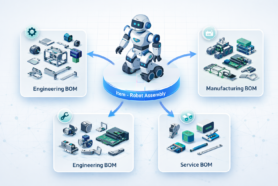
BOM management is a complex discipline and enterprise companies are facing many challenges to create an efficient and robust system and process to manage structured data about products (BOMs) with all related information. It is becoming critical these days when companies are looking at how to develop products faster and in more competitive ways.
How Enterprise Systems Manage BOMs
While there is a broad agreement of having Enterprise Systems manage released information about products, companies are experiencing substantial challenges when they need to have a system to effectively manage new product development (NPD), innovate, and collaborate inside of the teams and with contractors and suppliers.
One of OpenBOM’s customers, a Fortune 500 global electronic manufacturing company indicated the challenges of both managing data using Excel, but also the difficulties of managing it using existing enterprise PLM and ERP systems. Here is how their engineering manager speaks about the problems
The existing legacy PLM environment is too complex and too costly, cannot deliver an easy model to collaborate, and fails to provide an agile environment for production planning, which is typically handled by a super sophisticated corporate ERP system. For agile new product development, these two existing systems (PLM and ERP) were like a heavyweight that was slowing the NPD process down.
Shortcomings of BOM Management Using Enterprise Systems
The problem this company faced was not unique. We asked Chad Jackson, CEO and Chief Analyst of Lifecycle Insight to speak about shortcomings of enterprise systems such as PLM and ERP when they need to manage the agile new product development processes and help companies collaborate across multiple teams.Here are the top 3 shortcomings Chad talks about.
1- Manage changes effectively.
To make a change, users are forced to go to multiple interfaces with many iterations needed to change or add the data. It causes substantial additional efforts and inefficiencies.
2- Inability to keep up with the information.
Multiple changes are happening in multiple places. The problem is that all these integrations take time to develop and connections can be broken easily. As a result, people don’t have access to the most up-to-date information.
3- Information availability.
Usually, the enterprise systems are available to a specific group of people (PLM users, ERP users, etc). Access to these systems is limited because of the high license cost, training needed to educate people on how to use these systems, and many other factors. There’s also the need to have information and work at the same time. Inability to work together is the biggest problem while the demand to collaborate was never as high as today.
Watch the video and learn more about the problems.
Conclusion
Enterprise systems are super inefficient when it comes to the ability to collaborate, manage information collectively and perform multiple changes. They slow down companies and when it comes to new product development and the need to establish agile processes they fastly become a huge burden on the teams. New cloud technologies and SaaS applications are a remedy to the shortcomings of enterprise PLM and ERP shortcomings.
Check out how OpenBOM can help you – REGISTER FOR FREE and start a 14-day trial today.
Best, Oleg
Join our newsletter to receive a weekly portion of news, articles, and tips about OpenBOM and our community.










